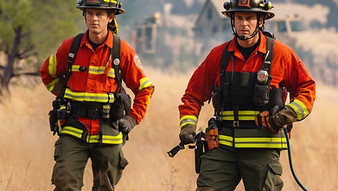Wildfire Protection and Resiliency
Building a Safer, Stronger Boulder
Just weeks after I was sworn into my first term, the Marshall Fire devastated communities just east of us—burning more than 1,000 homes and causing over $2 billion in damage. It was a horrifying reminder that climate change isn’t a future threat—it’s already here. Boulder was lucky that day. If the fire had sparked just a few miles west, our story could have been drastically different.
As climate-driven wildfires become more frequent and intense, we must act with urgency and clarity. I believe in proactive, science-based strategies that align climate awareness, community collaboration, and equitable resilience. That’s why I championed Boulder’s updated Wildland Urban Interface (WUI) code and our Wildfire Protection Plan—important steps toward building a more fire-resilient future.
TL;DR
🔥 Wildfires are here
Boulder must act before it’s too late
🏡 Fix the fire safety gap
West of Broadway homes lack basic protections, endangering the whole city
♻️ Educate. Empower. Enforce.
A 3-part strategy to reduce risk & build shared responsibility
🚫 Ban flammable landscaping
Juniper removal = smarter, safer citywide vegetation policy
🚒 Strengthen our fire response
Invest in infrastructure & explore Boulder’s own fire team
🌎 Resilience takes all of us
A safer Boulder depends on planning, policy & community action

WUI CODE
EXPLAINED
The new WUI code classifies areas of the city by wildfire risk; Class 1 zones border our forests and Open Space lands, while Class 3 covers more urban areas, and Class 2 is a mix of 1 & 3. The code introduces exterior requirements for siding, venting, non-combustible zones, and other proven measures to help firefighters protect homes and lives. As of now, these rules only apply when a home is significantly remodeled or rebuilt, leaving thousands of existing homes untouched and vulnerable.
Wildland Urban Interface Code

Wildfire
Protection Plan
This plan outlines a full suite of strategies: prescribed burns, forest thinning, investments in wildland fire vehicles, and other proven best practices. While comprehensive and well-crafted, the plan currently lacks the funding needed to implement these actions at the necessary scale. We must prioritize allocating real resources to accelerate its rollout.
Wildfire Protection Plan
A Critical Blind Spot
Our greatest vulnerability is that existing homes, particularly those on the west side, are not required to meet Fire-Wise standards. Many are surrounded by dense vegetation, flammable junipers, and wood siding. These conditions put not just those homes at risk, but the entire city downwind. Firefighters consistently emphasize that stopping the first home from catching fire is the key to saving entire neighborhoods.
How I'm Working On It:
-
Advocating for policy requiring basic Fire-Wise upgrades at the time of sale
-
Supporting a citywide ban on juniper bushes and a phased removal plan
-
Calling for required Fire-Wise standards for all rental properties to ensure citywide compliance
EDUCATE. EMPOWER. ENFORCE.
This is the foundation of my three-point strategy to reducing wildfire risk for existing homes: Click here for more details.
-
Educate homeowners on their risk and mitigation options.
-
Empower them with incentives and support to take action.
-
Enforce fair, phased-in rules to ensure community-wide safety.
How I'm Working On It:
-
Pushing for stronger homeowner education campaigns around risk and mitigation
-
Exploring city-backed incentives to support fire-hardening and defensible space
-
Proposing fair, phased-in regulations to create shared responsibility and ensure everyone does their part
Strengthening Wildland Fire Response
As wildfire risks grow, Boulder needs to be ready—not just with plans, but with trained personnel and the right equipment.
How I'm Working On It:
-
Supporting increased investment in wildland firefighting infrastructure
-
Exploring the feasibility of Boulder forming its own Type-3 fire team
-
Championing regional collaboration for faster, smarter response
Resilience is a shared responsibility.
Boulder can only become truly fire-resilient if we take a comprehensive, all-in approach. By aligning enforcement, financial support, landscape stewardship, and community responsibility, we can build a city that’s safer, stronger, and more prepared, not just for today’s threats, but for future generations.



